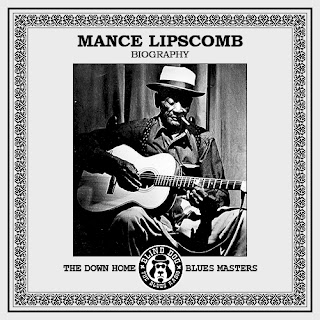Beau De Glen Lipscomb (b. April 9, 1895 in Navasota, TX, d. January 30, 1976 in Navasota, TX) was a blues singer, guitarist and songster. He was born Beau De Glen Lipscomb near Navasota, Texas. As a youth he took the name Mance (short for emancipation) from a friend of his oldest brother, Charlie.
The son of a former slave and professional fiddle player, Lipscomb initially learned that instrument and later the guitar. He began playing the guitar at an early age and played regularly for years at local gatherings, mostly what he called "Saturday night suppers" hosted by someone in the area. He and his wife regularly hosted such gatherings for a while. Until around 1960, most of his musical activity took place within what he called his "precinct", the area around Navasota. For many years he played on a solely local basis, while working as a farmer, and only made his first recordings at the age of 65, in 1960.
He was discovered and recorded by Mack McCormick and Chris Strachwitz in 1960, during a revival of interest in the country blues. He recorded many albums of blues, ragtime, Tin Pan Alley, and folk music (most of them released by Strachwitz's Arhoolie Records), singing and accompanying himself on acoustic guitar. Lipscomb had a "dead-thumb" finger-picking guitar technique and an expressive voice. He honed his skills by playing in nearby Brenham, Texas, with a blind musician, Sam Rogers. His first release was the album Texas Songster (1960). Lipscomb performed songs in a wide range of genres, from old songs such as "Sugar Babe" (the first he ever learned), to pop numbers like "Shine On, Harvest Moon" and "It's a Long Way to Tipperary". In 1961 he recorded the album Trouble in Mind, released by Reprise Records. In May 1963, he appeared at the first Monterey Folk Festival, (which later became the Monterey Pop Festival) alongside other folk artists such as Bob Dylan, and Peter, Paul and Mary in California. Following his discovery by McCormick and Strachwitz, Lipscomb became an important figure in the American folk music revival of the 1960s. He was a regular performer at folk festivals and folk-blues clubs around the United States, notably the Ash Grove in Los Angeles, California. Over the following 15 years, he made a series of highly regarded albums, mainly for Chris Strachwitz’s Arhoolie Records label. On the strength of these and his frequent live performances, he built up a very strong reputation for his skills as a singer of a wide range of material. His remarkably extensive repertoire encompassed gospel, rags, ballads and other traditional songs, as well as Texas-style blues. Unlike many of his contemporaries, Lipscomb did not record in the early blues era. His life is well documented thanks to his autobiography, I Say Me for a Parable: The Oral Autobiography of Mance Lipscomb, Texas Bluesman, narrated to Glen Alyn (published posthumously). He also appeared in several films, including a short 1971 documentary film (biopic) by Les Blank, called A Well Spent Life.
He died in Navasota, TX in 1976, two years after suffering a stroke. He is buried in Oakland Cemetery, Navasota.
* * * * *
By Cub Koda
Like Leadbelly and Mississippi John Hurt, the designation as strictly a blues singer dwarfs the musical breadth of Mance Lipscomb. Born on April 9, 1895 in Navasota, TX, Lipscomb was a sharecropper/tenant farmer all his life who didn't record until 1960, "songster" fits what Lipscomb did best. A proud, yet unboastful man, Lipscomb would point out that he was an educated musician, his ability to play everything from classic blues, ballads, pop songs to spirituals in a multitude of styles and keys being his particular mark of originality. He appeared at numerous blues and folk festivals throughout the '60s, released several albums on Arhoolie and even one for a major label, Reprise, in 1970, Trouble in Mind. Four years later, Lipscomb retired from the festival circuit and passed away on January 30, 1976 in his hometown of Navasota, TX. He was 81. With a wide-ranging repertoire of over 90 songs, Lipscomb may have gotten a belated start in recording, but left a remarkable legacy to be enjoyed.


